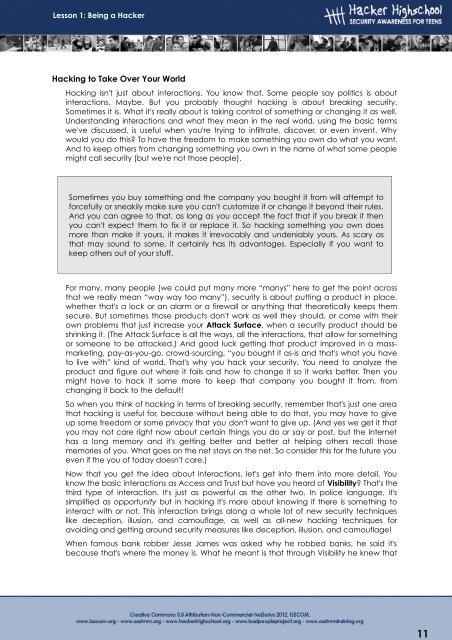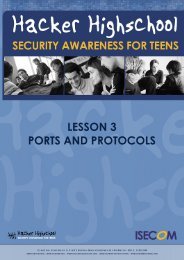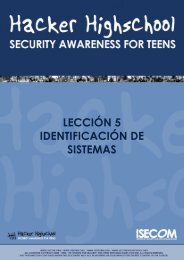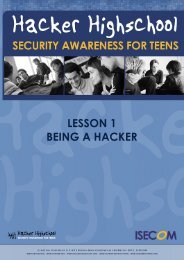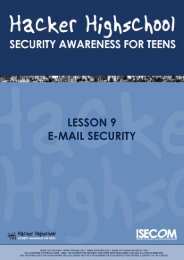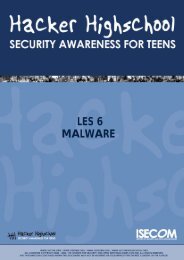Lesson 1: Being a Hacker - Hacker Highschool
Lesson 1: Being a Hacker - Hacker Highschool
Lesson 1: Being a Hacker - Hacker Highschool
Create successful ePaper yourself
Turn your PDF publications into a flip-book with our unique Google optimized e-Paper software.
11<br />
<strong>Lesson</strong> 1: <strong>Being</strong> a <strong>Hacker</strong><br />
Hacking to Take Over Your World<br />
Hacking isn't just about interactions. You know that. Some people say politics is about<br />
interactions. Maybe. But you probably thought hacking is about breaking security.<br />
Sometimes it is. What it's really about is taking control of something or changing it as well.<br />
Understanding interactions and what they mean in the real world, using the basic terms<br />
we've discussed, is useful when you're trying to infiltrate, discover, or even invent. Why<br />
would you do this? To have the freedom to make something you own do what you want.<br />
And to keep others from changing something you own in the name of what some people<br />
might call security (but we're not those people).<br />
Sometimes you buy something and the company you bought it from will attempt to<br />
forcefully or sneakily make sure you can't customize it or change it beyond their rules.<br />
And you can agree to that, as long as you accept the fact that if you break it then<br />
you can't expect them to fix it or replace it. So hacking something you own does<br />
more than make it yours, it makes it irrevocably and undeniably yours. As scary as<br />
that may sound to some, it certainly has its advantages. Especially if you want to<br />
keep others out of your stuff.<br />
For many, many people (we could put many more “manys” here to get the point across<br />
that we really mean “way way too many”), security is about putting a product in place,<br />
whether that's a lock or an alarm or a firewall or anything that theoretically keeps them<br />
secure. But sometimes those products don't work as well they should, or come with their<br />
own problems that just increase your Attack Surface, when a security product should be<br />
shrinking it. (The Attack Surface is all the ways, all the interactions, that allow for something<br />
or someone to be attacked.) And good luck getting that product improved in a massmarketing,<br />
pay-as-you-go, crowd-sourcing, “you bought it as-is and that's what you have<br />
to live with” kind of world. That's why you hack your security. You need to analyze the<br />
product and figure out where it fails and how to change it so it works better. Then you<br />
might have to hack it some more to keep that company you bought it from, from<br />
changing it back to the default!<br />
So when you think of hacking in terms of breaking security, remember that's just one area<br />
that hacking is useful for, because without being able to do that, you may have to give<br />
up some freedom or some privacy that you don't want to give up. (And yes we get it that<br />
you may not care right now about certain things you do or say or post, but the Internet<br />
has a long memory and it's getting better and better at helping others recall those<br />
memories of you. What goes on the net stays on the net. So consider this for the future you<br />
even if the you of today doesn't care.)<br />
Now that you get the idea about interactions, let's get into them into more detail. You<br />
know the basic interactions as Access and Trust but have you heard of Visibility? That's the<br />
third type of interaction. It's just as powerful as the other two. In police language, it's<br />
simplified as opportunity but in hacking it's more about knowing if there is something to<br />
interact with or not. This interaction brings along a whole lot of new security techniques<br />
like deception, illusion, and camouflage, as well as all-new hacking techniques for<br />
avoiding and getting around security measures like deception, illusion, and camouflage!<br />
When famous bank robber Jesse James was asked why he robbed banks, he said it's<br />
because that's where the money is. What he meant is that through Visibility he knew that


